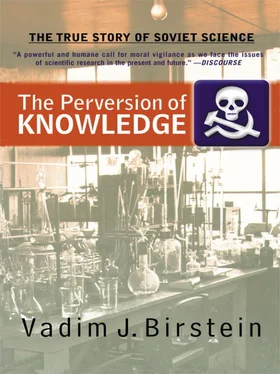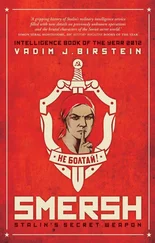122. The Politburo resolution dated June 12, 1922 (Izvestiya VtsIK, 1922, No. 1573), cited in Selezneva, “Dokumenty iz fonda Byuro Sekretariata TsK VKP(b),” p. 931.
123. Rokityansky, Ya. G., “Dva pis’ma akademika I. P. Pavlova” [Two letters of Academician I. P. Pavlov], Vestnik Akademii Nauk SSSR 10 (1991): 87–89 (in Russian).
124. Mochalov, I. I., “V. I. Vernadsky i Glavlit” [V. I. Vernadsky and Glavlit], Vestnik Instituta Istorii Estestvoznaniya i Tekhniki 2 (1999): 150–163 (in Russian).
125. For details, see Blyum, Arlen V., Sovetskaya tsenzura v epokhu total’nogo terrora, 1929–1953 [Soviet Censorship During the Epoch of Total Terror, 1929–1953] (St. Petersburg: Akademicheskii Proekt, 2000), pp. 89–93 (in Russian). A photo of the first page of copy no. 785 of “The Combined List of Books That Should Be Taken from Libraries and Bookstores,” dated 1973, is given in King, David, The Commissar Vanishes: The Falsification of Photographs and Art in Stalin’s Russia (New York: Henry Holt, 1999), p. 12.
126. Dzerzhinsky’s notes of his conversation with Lenin on September 5, 1922, and an instruction to Unshlikht from Dzerzhinsky’s diary are given in Latyshev, Rassekrechennyi Lenin , pp. 213–214.
127. See the history of reorganizations of this department in Kokurin and Petrov, Lubyanka, p. 126. On changes during and after “perestroika,” see Waller, J. Michael, Secret Empire: The KGB in Russia Today (Boulder: Westview Press, 1994), pp. 16, 71.
128. Reiss, Albert, ed., Molotov Remembers: Inside Kremlin Politics. Conversations with Felix Chuev (Chicago: Ivan R. Dee, 1993), p. 121.
129. Ibid., p. 237.
130. Koltsov, Sozdanie i deyatel’nost, p. 69.
131. Graham, Loren R., The Soviet Academy of Sciences and the Communist Party, 1927–1932 (Princeton: Princeton University Press, 1967), pp. 80–153; Levin, A. E., “Expedient Catastrophe: A Reconsideration of the 1929 Crisis at the Soviet Academy of Sciences,” Slavic Review 47 (2) (1988): 261–279; Aleksandrov, D. A., and N. L. Krementsov, “Opyt putevoditelya po neizvedannoi zemle: Predvaritelnyi ocherk sotsialnoi istorii sovetskoi nauki (1917–1950-e gody)” [An attempt at a guidebook for unknown territory: Preliminary outline of the social history of Soviet science (1917–1950s)], Voprosy Istorii Estestvoznaniya i Tekhniki 4 (1989): 67–80 (in Russian); Brachev, V. S., “Ukrashchenie stroptivoi ili kak Akademiya Nauk obuchali” [The taming of an obstinate character, or how the Academy of Sciences was taught obedience], V estnik Akademii Nauk SSSR 2 (1990): 120–127 (in Russian); Perchenok, “Akademiya Nauk,” pp. 163–238; Orel, V. M., “Bitva so zdravym smyslom: Kak prinimalsya ustav Akademii 1930 goda” [A fight against common sense: How the statute of the academy was accepted], Vestnik Rossiiskoi Akademii Nauk 64 (1994): 366–375 (in Russian); Tolz, Russian Academicians, pp. 26–67.
132. Popovsky, Mark, Manipulated Science: The Crisis of Science and Scientists in the Soviet Union Today, trans. P. S. Falla (Garden City, NY: Doubleday, 1979), p. 29.
133. Romanovsky, “Pervyi demokraticheski izbrannyi prezident,” pp. 173–175.
134. Document 1 in Malysheva, M. P., and V. S. Poznansky, “Partiinoe rukovodstvo Akademiei nauk: Sem’ dokumentov iz byvshego arkhiva Novosibirskogo obkoma KPSS” [The Party leadership of the Academy of Sciences: Seven documents from the former archive of the Novosibirsk Regional Committee of the Communist Party], Vestnik Rossiiskoi Akademii Nauk 64 (11) (1994): 1033–1041 (in Russian).
135. Cited in Grigoryan, “Sotsialno-politicheskie vzglyady.” Vera Tolz wrongly attributes this letter to the 1930s (Tolz, Russian Academicians, p. 130).
136. Yeremina and Roginsky, Rasstrel’nye spiski , p. 290. Other members of the same case are mentioned in Chapter 2.
137. Koltsov, A. V., “Vybory v Akademiyu Nauk SSSR v 1929 g.” [The elections to the Academy of Sciences in 1929], V estnik Instituta Istorii Estestvoznaniya i Tekhniki 3 (1990): 53–66 (in Russian).
138. Perchenok, “Akademiya Nauk,” p. 190; Tolz, Russian Academicians, p. 45.
139. Krementsov, Stalinist Science, p. 302.
140. Ibid.
141. Antonova, N. S., and N. V. Drozdova, “Rossiiskie uchenye—akademiku A. V. Lunacharskomu” [From Russian academicians to Academician A. V. Lunacharsky], V estnik Rossiiskoi Akademii Nauk 64 (3) (1994): 253–265 (in Russian).
142. Volgin replaced Academician Oldenburg, who was permanent secretary from 1904. In 1935, the Politburo replaced Volgin with Lenin’s former secretary Nikolai Gorbunov (Krementsov, Stalinist Science, p. 41).
143. On Vavilov, see Adams, Mark, “Vavilov, Nikolai Ivanovich,” in Gillispie, Charles Coulston, ed., Dictionary of Scientific Biographies, vol. 15, supp. 1 (New York: Charles Scribner’s Sons, 1978), pp. 505–513; Crow, James F., “N. I. Vavilov, Martyr of Genetic Truth,” Genetics 134 (1) (1993): 1–4.
144. Koltsov, Sozdanie i deyatel’nost, p. 110.
145. Brachev, “Ukroshchenie stroptivoi,” pp. 120–125; Koltsov, “Vybory.”
146. Smagina, G. I., and V. M. Orel, “Novye dokumenty o deyatelnosti Komissii po istorii znanii AN SSSR (k 70-letiyu organizatsii)” [New documents on the activity of the AN USSR Commission on the History of Knowledge (up to its 70th anniversary)], Voprosy Istorii Estestvoznaniya i Tekhniki 2 (1993): 54–66 (in Russian).
147. Tugarinov, I. A., “VARNITSO i Akademiya nayk” [VARNITSO and the Academy of Sciences], Voprosy Istorii Estestvoznaniya i Tekhniki 4: 46–55 (in Russian).
148. Heller and Nekrich, Utopia in Power, pp. 208–209, 211–212, 228.
149. Lyons, Eugene, Assignment to Utopia (New Brunswick, NJ: Transaction Publishers, 1991), p. 127.
150. Perchenok, “Akademiya Nauk,” pp. 228–230.
151. Published in Yanshina, F. T., “Neizvestnyi Vernadsky” [The unknown Vernadsky], V estnik Rossiiskoi Akademii Nauk 63 (9) (1993): 822–829 (in Russian).
152. Brachev, “Ukroshchenie stroptivoi,” p. 195.
153. Perchenok, “Akademiya Nauk,” pp. 204–205.
154. Tolz, Russian Academicians, p. 51.
155. Ibid.
156. A transcript of the meeting is given in Perchenok, “Akademiya Nauk,” pp. 226–230.
157. Perchenok, “Akademiya Nauk,” pp. 214–215.
158. Brachev, V. S., “Opasnaya professiya—istorik: Stranitsy zhizni akademika S. F. Platonova” [Historian—a dangerous profession: Episodes from the life of S. F. Platonov], V estnik Akademii Nauk SSSR 9 (1991): 65–73 (in Russian); Brachev, V. S., “Ispoved’ uznika OGPU (neizvestnaya rukopis’ akademika S. F. Platonova)” [The confession of an OGPU prisoner (an unknown manuscript of Academician S. F. Platonov], Vestnik Rossiiskoi Akademii Nauk 9 (1992): 118–128 (in Russian).
159. Pokrovsky’s letter to the OGPU Secret Department dated September 29, 1932, Russian Center for the Preservation and Study of Documents of Most Recent History (RTsKhIDNI), F. 147, Op. 2, D. 11, L. 3. Reproduced in Yesina, A. V., “‘Mne zhe oni sovershenno ne nuzhny’ (Sem’ pisem iz lichnogo arkhiva akademika M. N. Pokrovskogo)” [“I do not need them” (Seven letters from the personal archive of Academician M. N. Pokrovsky)], Vestnik Rossiiskoi Akademii Nauk 6 (1992): 103–114 (in Russian).
160. Chebrikov et al., Istoriya , p. 274; Rossi, Jacques, The Gulag Handbook: An Encyclopedia Dictionary of Soviet Penitentiary Institutions and Terms Related to the Forced Labor Camps (New York: Paragon House, 1989), p. 453.
Читать дальше











